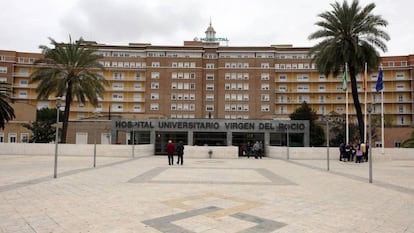Spain reports first locally transmitted coronavirus case
A man in the Madrid region is in serious condition as the national tally rises to 17, confirming suspicions that the virus had been circulating for days without being detected

A 62-year-old man who has been in a Seville hospital for pneumonia since February 20 has been confirmed as the first case of local Covid-19 contagion registered in Spain. The diagnosis is highly significant as it confirms the suspicions of many specialists after the spike in coronavirus cases in Italy: “The virus has been circulating for several days in Spain and we hadn’t detected it,” said the head of infectious diseases at a major Spanish hospital earlier this week.
The patient, who is being treated at the Virgen del Rocío hospital in Seville, is from nearby Huelva and has not left Spain in recent weeks, according to the regional government, who suggested that a “meeting held in Málaga” could have been the origin of his infection.
By Thursday afternoon a total of 17 cases had been reported in Spain. Of these, 15 were detected this week after hospitals adopted new criteria and began testing pneumonia patients for Covid-19.
One patient in the Madrid region is reported to be in serious condition, with the other cases described as mild. The most severe case is a 77-year-old with pre-existing medical conditions who is being treated in a hospital in Torrejón de Ardoz, in the east of Madrid.
Obviously, if there are cases with risk factors, it is possible that someone will die in our countryFernando Simón, Coordination Center for Health Alerts and Emergencies
The sudden increase and the confirmation that the disease is now being transmitted in Spain brings “a new scenario in which the health system and society will have to learn to live with the virus,” said all of the experts consulted by EL PAÍS.
“Obviously there have to be fatalities,” said Fernando Simón, director of the Health Ministry’s Coordination Center for Health Alerts and Emergencies. “It is not a serious disease, but it is not trivial either. Obviously, if there are cases with risk factors, it is possible that someone will die in our country.”
Spain’s eastern Valencia region confirmed its second case of coronavirus on Thursday: a man who was among the 2,500 Valencia soccer club fans who traveled to Milan on February 19 to see their team in a Champions League match. Meanwhile a new infection was also confirmed in Barcelona on Thursday: a 22-year-old woman from Tenerife who had also recently traveled to Milan.
We’re not going to see hospitals overwhelmed with thousands of sick peoplePere Godoy, president of the Spanish Epidemiology Society
A total of four cases were confirmed in Spain on Wednesday, including the man being treated in Seville. But the other three – in Madrid, Barcelona and the Canary Island of La Gomera – were, like the previous cases, detected in people who had picked up the infection abroad.
The first two cases were discovered in La Gomera on January 31, and on the Balearic Island of Palma de Mallorca on February 9, but both of those patients have since been released from hospital.
While the situation is significant, it is not particularly dramatic, the experts say. “Mortality from the coronavirus is relatively low, between 2% and 3%, and it is lower outside of China,” explained Pere Godoy, the president of the Spanish Epidemiology Society. “Its transmissibility, while not negligible, is also not explosive. We’re not going to see hospitals overwhelmed with thousands of sick people. The Spanish health system is amply prepared to deal with whatever is coming.”
The number of infections could be five, 10 or 100, we just don’t knowAndalusian health sources
An example helps to put the problem into perspective. All of the cases diagnosed in Italy until yesterday – 400, most of them light – are approximately the same that any major Spanish hospital would deal with for flu during the annual spike in the illness.
The discovery of the local infection in the case of the man from Huelva was no coincidence, but rather thanks to a change in the clinical protocols in Spanish hospitals. After the rise in cases in Italy, health centers in Spain are now actively testing patients who are being treated for pneumonia where the origin of the illness is unclear. Until Monday, such tests were only being carried out on patients who had recently traveled to China.
“We are like Italy last Friday,” health sources from Andalusia explained. “The number of infections could be five, 10 or 100, we just don’t know.”
The Andalusian authorities have begun to investigate all of the contact the man from Huelva has had, while the patient himself is being treated in isolation. His condition is not serious.
English version by Simon Hunter.
Tu suscripción se está usando en otro dispositivo
¿Quieres añadir otro usuario a tu suscripción?
Si continúas leyendo en este dispositivo, no se podrá leer en el otro.
FlechaTu suscripción se está usando en otro dispositivo y solo puedes acceder a EL PAÍS desde un dispositivo a la vez.
Si quieres compartir tu cuenta, cambia tu suscripción a la modalidad Premium, así podrás añadir otro usuario. Cada uno accederá con su propia cuenta de email, lo que os permitirá personalizar vuestra experiencia en EL PAÍS.
¿Tienes una suscripción de empresa? Accede aquí para contratar más cuentas.
En el caso de no saber quién está usando tu cuenta, te recomendamos cambiar tu contraseña aquí.
Si decides continuar compartiendo tu cuenta, este mensaje se mostrará en tu dispositivo y en el de la otra persona que está usando tu cuenta de forma indefinida, afectando a tu experiencia de lectura. Puedes consultar aquí los términos y condiciones de la suscripción digital.








































